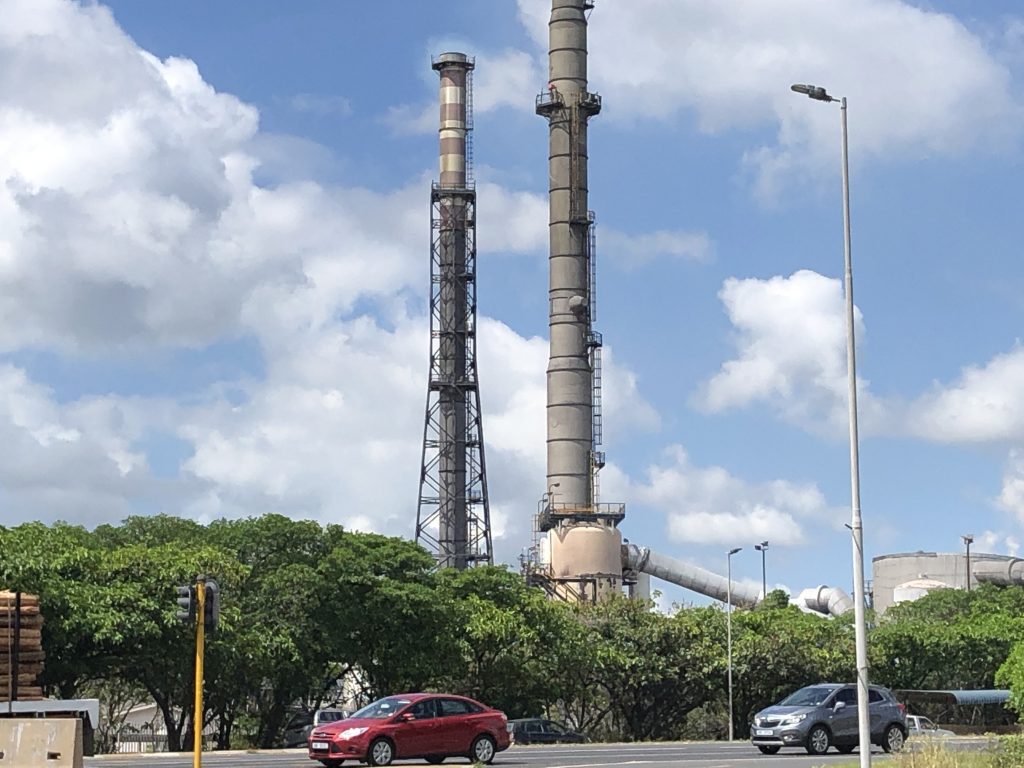All fossil fuels (including gas) are accelerators of the climate threat
For immediate release: 06 May 2021
Durban, South Africa: In April 2021, the South Durban Community Environmental Alliance (SDCEA) and groundWork filed review papers in the Pretoria High Court challenging the Department of Forestry, Fisheries and the Environment’s authorisation of the Richards Bay 3000MW Combined Cycle Power Plant. This landmark litigation marks the first time that a gas-to-power plant has been challenged in a court in South Africa.
Represented by environmental law specialists, Cullinan and Associates, and supported by Natural Justice, SDCEA and groundWork are acting in the interests of the public and the environment in challenging the authorisation granted to state-owned public utility, Eskom.
SDCEA and groundWork have approached the High Court after Minister Barbara Creecy refused the organisations’ appeal against this decision, meaning that the authorisation now comes under judicial review.
Gas is not a safe alternative to coal
The gas-to-power plant will be fuelled by dirty gas, a potent fossil fuel, via a gas pipeline that will be installed from the Richards Bay Port. In their papers, the organisations argue that the total life-cycle greenhouse gas and methane emissions from the power plant should have been properly assessed, as the latest science on gas suggests that the greenhouse gas footprint of gas is worse than that of either coal or oil, particularly when considered in the 20-year timescale most relevant to our climate future. Further, the plant is not necessary to meet South Africa energy needs because cleaner, more cost-efficient alternatives are available.
The misconception and the flaunting of gas as a safe alternative is both misleading and false. Natural gas cannot, and should not, be viewed in isolation from coal and oil. As it is, it is also a fossil fuel with detrimental environmental consequences – and is hazardous and a major risk to people in the case of an explosion.
Building this polluting plant commits South Africa to a regressive, climate-harming future. South Africa is well positioned to achieve a renewable energy transition without succumbing to the fossil fuel industry’s misleading and dangerous, profit-driven agenda that will lock the country into decades of dirty gas dependency and emissions.
The emissions from the entire lifecycle of the project are not properly accounted for, and these are significant – and would be inconsistent with South Africa’s international commitments. Urgent action is needed to reduce the contribution of emissions into the atmosphere and the South African government is far behind on its international commitments to do so.
“South Africa cannot spend millions on infrastructure that will bankrupt the country and make energy unaffordable to people. South Africa has to move to renewable energy through a Just Transition and ensure a cleaner and safer world for future generations.” – Desmond D’Sa, South Durban Community Environmental Alliance.
“Gas infrastructure will lock South Africa into further fossil fuels and further climate greenhouse emissions and climate impacts. Fossil fuel emissions need to be reduced to zero as soon as possible because time left to prevent runaway climate change could have already shrunk to zero.” – Avena Jacklin, groundWork.
The Minister and the Chief Director: Integrated Environmental Authorisations have indicated their intention to oppose the review.
The legal challenge
The review is based on a number of concerns raised regarding the Environmental Impact Assessment (EIA) and the process of public participation that was undertaken. These are:
An inadequate assessment of the climate change impacts. Evidence now clearly shows that methane leaks during the full life-cycle of gas production, transport, and consumption make gas as harmful as coal. The EIA failed to assess the life-cycle impacts of gas, and the Minister’s position that gas is cleaner than coal is misleading and dangerous.
Furthermore, in the Earthlife Africa case handed down in 2017, the High Court considered how the environmental impacts posed by climate change should be assessed. This precedent was not considered.
An inadequate assessment of the need and desirability of the project. The Centre for Science and Industrial Research (CSIR) and Meridian, an independent auditing firm, have shown in a previous detailed modelling study that, under a least-cost scenario, a CCPP mid-merit gas plant, like the proposed Richards Bay plant, is not necessary for at least another 15 years, if at all, to meet South Africa’s energy demands. Until then, diesel can continue to be used by existing generators to meet reliability needs during limited hours of peak electricity demand.
This least-cost pathway avoids building expensive gas infrastructure unless and until the need arises and is economically justified, avoiding locking South Africa into long-term fuel cost commitments prematurely.
An inadequate assessment of alternatives to this project, which includes renewable energy. The Environmental Impact Report (EIR) excluded an assessment of whether renewable energy power sources could provide reliable energy instead of a massive gas plant.
An inadequate assessment of the cumulative environmental impacts of the project. The EIA failed to consider the cumulative impacts of the many other gas projects proposed in Richards Bay. This failure is inexcusable in light of the potential climate harms associated with these main projects.
An inadequate and procedurally unfair public participation process. The public participation process for this development was flawed, as many communities were excluded from the public participation process.
ENDS
Selected Court Papers:










